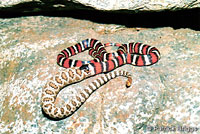Snake Behavior and Life History - Feeding


These are pictures and short videos of snakes preying on or attempting to prey on other animals: |
|||||||||||
Snakes Preying On Mammals |
|||||||||||
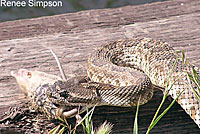 |
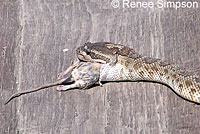 |
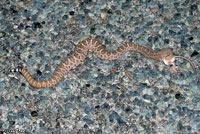 |
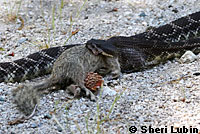 |
||||||||
| A Northern Pacific Rattlesnake eating a rodent. © Renee Simpson | This juvenile Western Diamond-backed Rattlesnake was found eating a rodent on an asphalt road at night. When a rattlesnake bites a rodent, poisoning it with its venom, the rodent often runs off a short distance before it dies. Sometimes it ends up on a road. The snake then follows the rodent's scent trail, finds the dead rodent, and eats it. That could be what happened here, or maybe not. The snake might have found a dead rodent that was run over by a car and decided to eat it. |
Adult Southern Pacific Rattlesnake eating a squirrel. This snake was fortunate to live under the deck of a building inhabited by biologists who carefully tolerated its presence and watched it emerge to take advantage of squirrels that fed beneath a bird feeder © 2006 Sheri Lubin | |||||||||
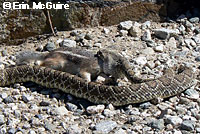 |
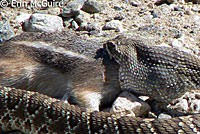 |
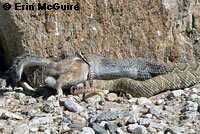 |
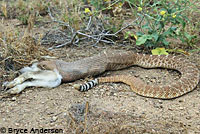 |
||||||||
| A Northern Mohave Rattlesnake eating a Harris Antelope Ground Squirrel. © Erin McGuire | 3.5 - 4 ft. long adult Red Diamond Rattlesnake eating a young adult Black-tailed Jackrabbit. © Bryce Anderson | ||||||||||
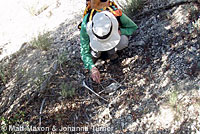 |
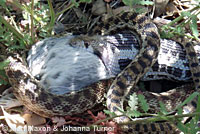 |
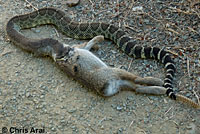 |
 |
||||||||
| Matt Maxon and Johanna Turner were hiking in Big Tujunga Canyon in Los Angeles County when they discovered a large dead rodent that appeared to have been partially swallowed and spit out. (Left) On returning to the same spot about two hours later, they noticed the rodent was gone, and soon discovered a San Diego Gophersnake swallowing it. (Right) Did the snake kill the rodent, attempt to eat it, then spit it out and return later to try again, or was more than one predator involved? We'll never know, but that sure is more than a mouthful. © Matt Maxon and Johanna Turner. |
A large adult Northern Pacific Rattlesnake eating an even larger rabbit. It's amazing how much a snake can eat. © Chris Arai |
||||||||||
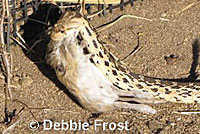 |
 |
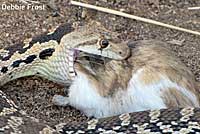 |
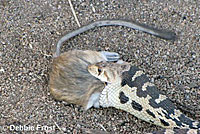 |
||||||||
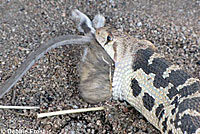 |
|||||||||||
| Debbie Frost watched this Great Basin Gophersnake crawl down a hole and quickly come back up with a kangaroo rat. The snake then crawled into the shade made by Debbie's shadow and ate the K-rat while she watched. |
|||||||||||
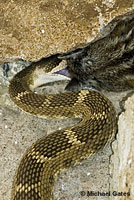 |
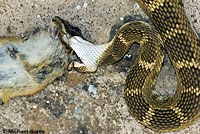 |
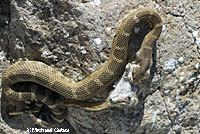 |
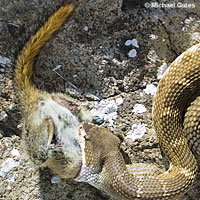 |
||||||||
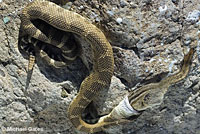 |
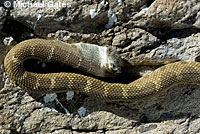 |
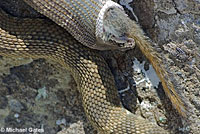 |
 |
||||||||
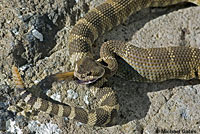 |
 |
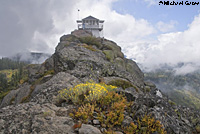 |
|||||||||
| In the ten pictures above, sequenced from left to right, top to bottom, a Northern Pacific Rattlesnake is shown eating a chipmunk at the top of the rocky fire lookout shown on the bottom right in Sierra County. Notice the huge lump in the snake in the last picture where the chipmunk has ended up. © Michael Gates |
|||||||||||
 |
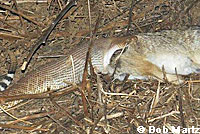 |
 |
|||||||||
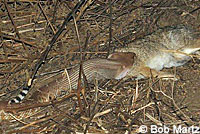 |
 |
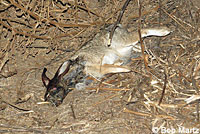 |
|||||||||
| Bob Martz found this adult Red Diamond Rattlesnake swallowing a brush rabbit when he was hiking on a hillside in Riverside County. After taking a few photographs, he left quickly so he would not scare the snake and cause it to disgorge its meal. But on his return he saw that the snake had left the rabbit uneaten, probably because it was too big for the snake to swallow. © Bob Martz |
|||||||||||
 |
 |
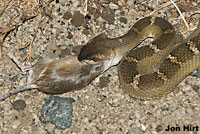 |
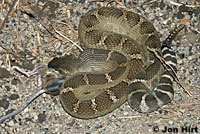 |
||||||||
| A Northern Pacific Rattlesnake eating a kangaroo rat in Alameda County © Jon Hirt |
|||||||||||
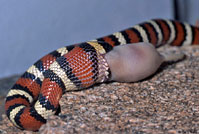 |
 |
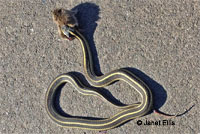 |
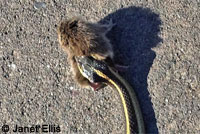 |
||||||||
| A captive juvenile California Mountain Kingsnake eating a hairless juvenile mouse. | Janet Ellis heard squeaking then saw a gartersnake rolling and twisting down an incline in Solano County. When they stopped rolling, the snake was the victor in its attempt to kill a vole. © Janet Ellis | ||||||||||
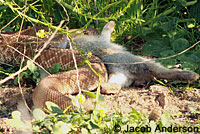 |
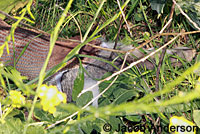 |
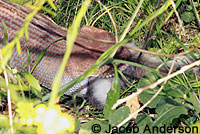 |
 |
||||||||
| Jacob Anderson found this Red Diamond Rattlesnake eating a cottontail rabbit in Riverside County in early February. © Jacob Anderson | |||||||||||
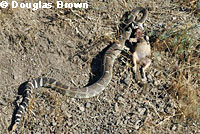 |
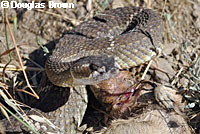 |
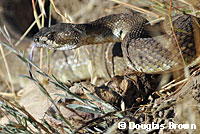 |
|||||||||
| This adult Northern Pacific Rattlesnake was seen shortly after it killed a California Ground Squirrel in Santa Clara County. It started to swallow the squirrel, but because it was on a popular hiking trail, it was frightened and stopped, probably to swallow later it after the spectators were gone. © Douglas Brown | |||||||||||
 |
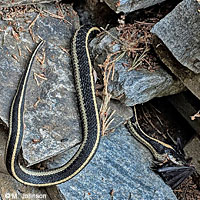 |
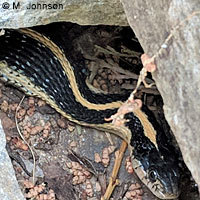 |
|||||||||
| Adult Mountain Gartersnake eating a bat. You can see the bulge of the bat inside the snake in the last picture. Plumas County © M. Johnson |
|||||||||||
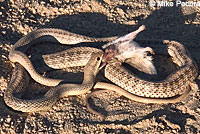 |
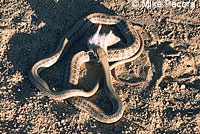 |
 |
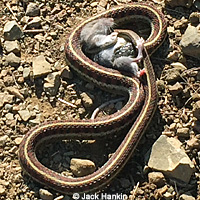 |
||||||||
| A Desert Patch-nosed Snake eating a rodent (probably a kangaroo rat) in the middle of a dirt road in San Bernardino County. The snake probably flushed the nocturnal rodent from its burrow then caught it on the road. © Mike Pecora | This Coast Gartersnake was observed killing a small rat in San Mateo County. © Jack Hankin |
||||||||||
 |
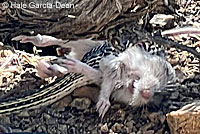 |
||||||||||
| Adult Desert Striped Whipsnake eating a pocket mouse in San Bernardino County © Hale Garcia-Dean | |||||||||||
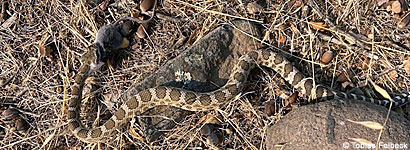 |
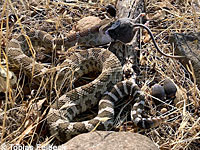 |
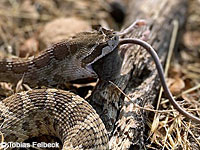 |
|||||||||
| Northern Pacific Rattlesnake eating a rodent in Tehama County © Tobis Felbeck | |||||||||||
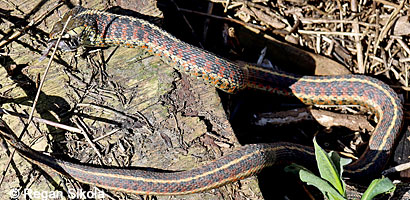 |
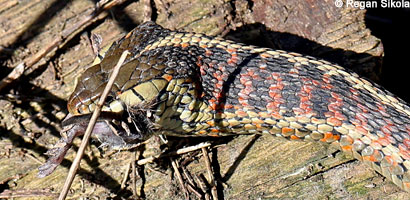 |
||||||||||
| Adult Coast Gartersnake eating a rodent in Monterey County © Regan Sikola | |||||||||||
 |
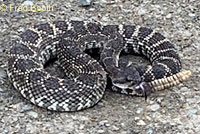 |
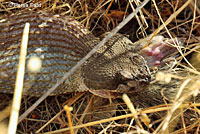 |
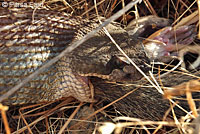 |
||||||||
| Left: Southern Pacific Rattlesnake eating a rat on an Orange County hiking trail. Right: The snake after eating. © Fred Booth |
Northern Pacific Rattlesnake eating a California Ground Squirrel in Santa Clara County © Parsa Fard | ||||||||||
Snakes Preying On Birds |
|||||||||||
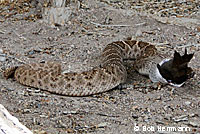 |
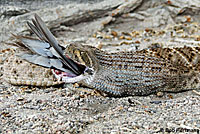 |
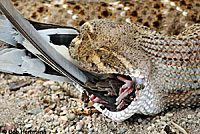 |
|||||||||
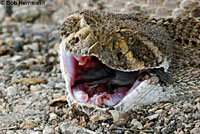 |
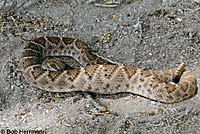 |
||||||||||
| Series of photos of a Western Diamond-backed Rattlesnake eating a dove in Cochise County, Arizona. © Bob Herrmann |
|||||||||||
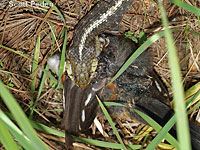 |
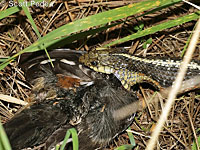 |
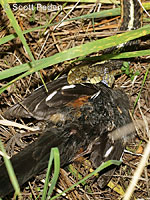 |
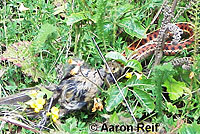 |
||||||||
| A Coast Gartersnake eating a Spotted Towhee. The bird appears to be too big for the snake to swallow, but the final outcome is unknown. © Scott Peden |
Adult Coast Gartersnake eating a bird, found by Zach Mumbach, Photo © Aaron Reif |
||||||||||
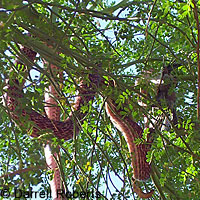 |
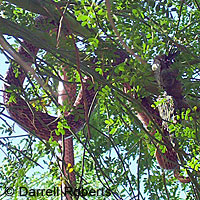 |
 |
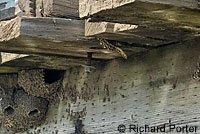 |
||||||||
| A large Red Coachwhip eating a dove in a tree in Arizona. © Darrell Roberts | A Pacific Gophersnake can be seen here not eating birds but most likely hunting for them. It's hanging down between the boards on a bridge in Sutter County with swallow's nests on its side. The snake was observed slowly moving closer to the nest, dropping down between two boards, waiting for 10 - 15 minutes, then moving back up and dropping down between two different boards closer to the nests and waiting again, as if it might have been waiting to catch a flying adult swallow. (You can see a swallow flying under the bridge on the right.) It might also have been planning on entering the nests to search for eggs or baby birds to eat. © Richard Porter | ||||||||||
 |
 |
 |
 |
||||||||
| This short video shows an adult Southwestern Speckled Rattlesnake in the last stages of swallowing a chicken in a chicken coop in the Santa Ana Mountains of Orange County. © Kevin Law |
© Yuval Helfman This adult Pacific Gophersnake was observed emerging from a cliff swallow nest under the eaves of a building where it was most likely hunting for nestlings. |
© Yuval Helfman Two weeks after the photo to the left was taken, the gophernake is still in the nest on the left. The swallows appear to be avoiding the nest, so the snake probably isn't ambush hunting. It's possible the snake has been resting in the nest while digesting a meal, or maybe it's just having trouble climbing back down since the building is 10-15 foot tall vertical walls. |
|||||||||
Snakes Preying On Fish |
|||||||||||
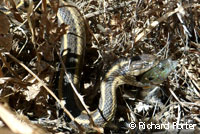 |
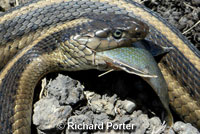 |
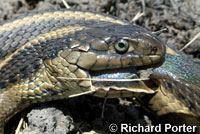 |
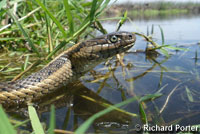 |
||||||||
| These pictures show an adult Giant Gartersnake eating a sunfish, Sutter County © Richard Porter |
|||||||||||
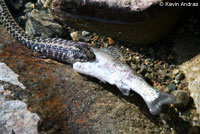 |
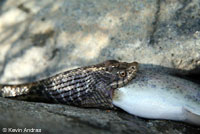 |
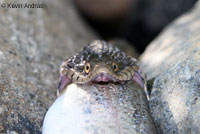 |
 |
||||||||
| These pictures show an Oregon Gartersnake eating a fish. © Kevin Andras. | Adult Two-striped Gartersnake eating a sucker on a rock next to the San Gabriel River, Los Angeles County. © Seth Coffman |
||||||||||
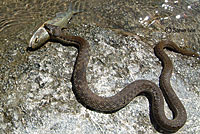 |
 |
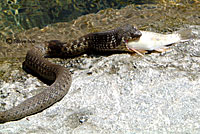 |
|||||||||
| Steve Ivie and his Cub Scout troupe saw this adult Two-striped Gartersnake enter a river, swim upstream, and grab a trout about 8 or 9 inches in length. The snake then dragged the trout onto a rock at the edge of the river, and eat it. © Steve Ivie |
|||||||||||
 |
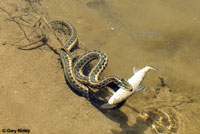 |
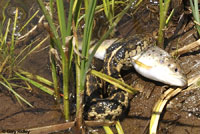 |
|||||||||
| This adult Sierra Gartersnake saw a brown trout rising in a creek in
El Dorado County, raced across the creek, grabbed the trout, and dragged it to the shore. © Gary Ridley |
|||||||||||
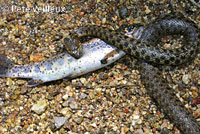 |
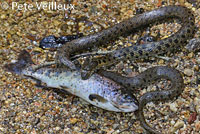 |
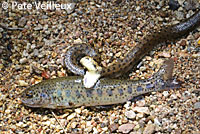 |
|||||||||
 |
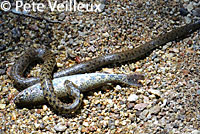 |
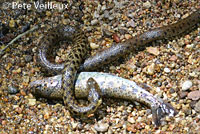 |
|||||||||
| Adult eating a trout pulled from a pool in a Monterey County creek that dried up during the summer of 2014 due to drought. © Pete Veilleux |
|||||||||||
 |
 |
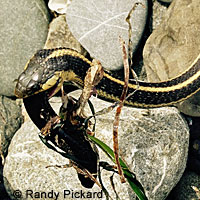 |
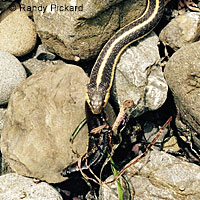 |
||||||||
| An Oregon Gartersnake eats a fish. © Linda Bostwick | Adult Coast Gartersnake eating a saltwater fish it found stranded in a tide pool on a rocky beach below the high tide mark in San Luis Obispo County © Randy Pickard | ||||||||||
 |
 |
 |
|||||||||
| A Two-striped Gartersnake eating a Threespine stickleback, Gasterosteus aculeatus, in San Luis Obisp County © Ryan Sikola | |||||||||||
 |
|||||||||||
| Adult Mountain Gartersnake catching a trout in a drying puddle in the Sierra Nevada Mountains. © Grigory Heaton |
|||||||||||
Snakes Preying On Snakes |
|||||||||||
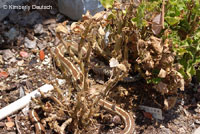 |
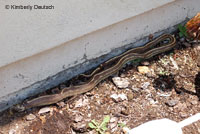 |
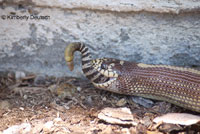 |
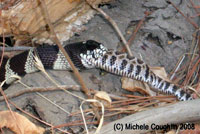 |
||||||||
| California Kingsnakes eat a wide variety of prey, including snakes. They are immune to rattlesnake venom, so they will eat rattlesnakes when they find one. This striped kingsnake is eating a juvenile Southern Pacific Rattlesnake. © Kimberly Deutsch | This California Kingsnake is almost finished eating a juvenile Northern Pacific Rattlesnake. © Michele Coughlin |
||||||||||
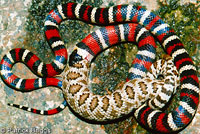 |
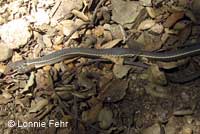 |
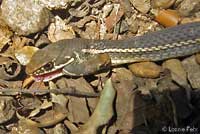 |
|||||||||
| This California Mountain Kingsnake is eating a juvenile Northern Pacific Rattlesnake, © Patrick Briggs |
Lonnie Fehr discovered this adult California Striped Racer trying to eat a juvenile California Striped Racer. |
||||||||||
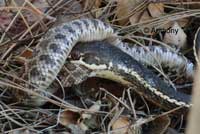 |
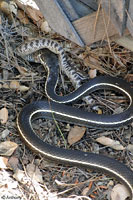 |
 |
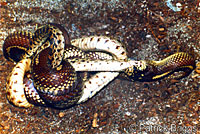 |
||||||||
| A California Striped Racer eats a juvenile Southern Pacific Rattlesnake in Los Angeles County. © Anthony | California Kingsnakes are powerful predators capable of eating other snakes almost as large as they are. Here you can see one eating a Gophersnake. © Patrick Briggs |
||||||||||
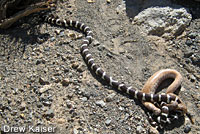 |
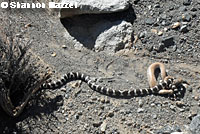 |
||||||||||
 |
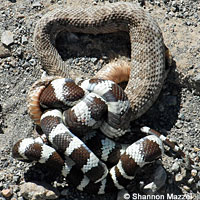 |
 |
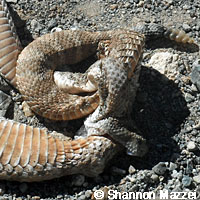 |
||||||||
| Stacy Holt with Death Valley National Park sent me the above six photos which were taken on 8/28/13 by National Park Service Employees Drew Kaiser and Shannon Mazzei. Drew and Shannon saw the snakes struggling at around 11 AM in near Towne Pass. A California Kingsnake was wrapped tightly around a Panamint Rattlesnake and the snakes were barely moving. Disturbed by the onlookers, the kingsnake retreated under a nearby bush. The rattlesnake was dead by that time, and appears to be biting itself, but was described as biting onto the kingsnake before it died. The kingsnake probably returned to swallow the rattlesnake after the people left. You can see other interesting wildlife sightings on the Death Valley National Park Facebook Page. |
|||||||||||
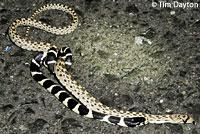 |
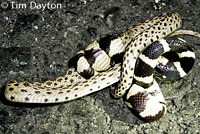 |
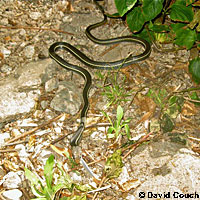 |
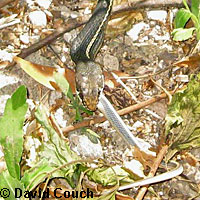 |
||||||||
| A California Kingsnake killing a Pacific Gophersnake for dinner. © Tim Dayton | A California Striped Racer eats a Coast Patch-nosed Snake in Los Angeles County, near Altadena. © David Couch |
||||||||||
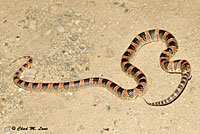 |
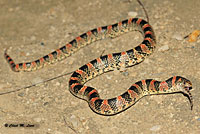 |
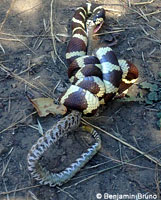 |
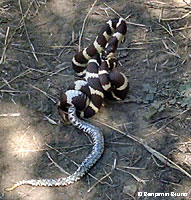 |
||||||||
| Chad M. Lane found this adult Long-nosed Snake in Alameda County eating another adult Long-nosed Snake. A report of the sighting was published in Herp Review in 2009 as the first documented occurrance of cannibalistic behavior in this species. © Chad M. Lane |
This California Kingsnake was discovered eating a juvenile Southern Pacific Rattlesnake in the Los Padres Mountains, Santa Barbara County © Benjamin Bruno | ||||||||||
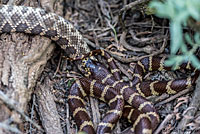 |
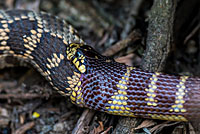 |
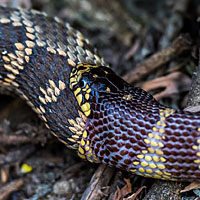 |
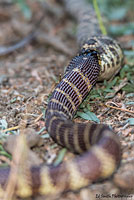 |
||||||||
| A California Kingsnake eating a Southern Pacific Rattlesnake © Ed Smith |
|||||||||||
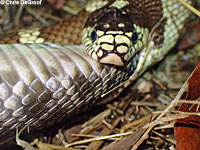 |
 |
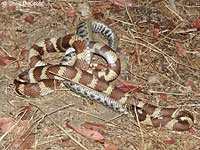 |
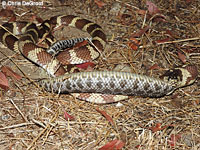 |
||||||||
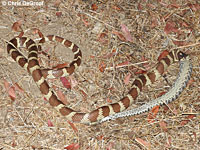 |
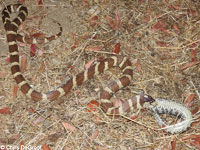 |
||||||||||
| California Kingsnake eating a Southern Pacific Rattlesnake in Los Angeles County © Chris DeGroof |
|||||||||||
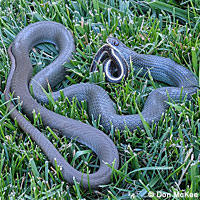 |
 |
 |
|||||||||
An adult Western Yellow-bellied Racer was observed trying to swallow an Aquatic Gartersnake on a lawn in Sonoma County, but the observers apparently spooked the racer, which dropped the gartersnake then climbed a rose bush. © Don KcKee |
A California Kingsnake eating a Pacific Gophersnake in Santa Clara County © Faris K |
||||||||||
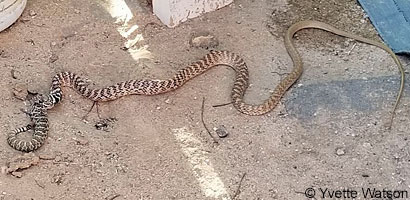 |
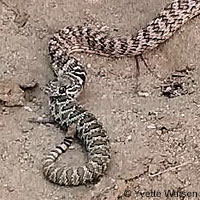 |
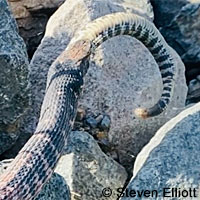 |
|||||||||
| Adult Red Coachwhip eating a juvenile Northern Mohave Rattlesnake, San Bernardino County © Yvette Watson | A Red Coachwhip eats a juvenile Southern Pacific Rattlesnake in Riverside County © Steven Elliott | ||||||||||
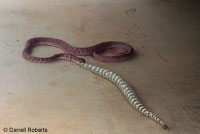 |
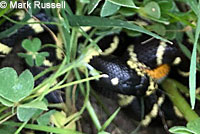 |
 |
|||||||||
| Red Coachwhips will eat whatever they can find and overpower, including snakes. Darrel Roberts found this one eating a young Southwestern Speckled Rattlesnake in his Phoenix driveway one morning. © Darrel Roberts | A juvenile California Kingsnake eats a San Bernardino Ring-necked Snake in Riverside County. © Mark Russell | Adult California Striped Racer eating a juvenile Northern Pacific Rattlesnake in Lake County. © Anonymous |
|||||||||
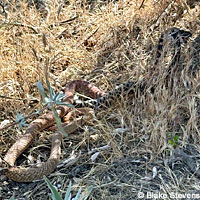 |
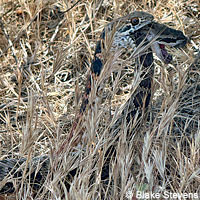 |
||||||||||
| This adult Red Coachwhip was observed preying on a Southern Pacific Rattlesnake next to a basket at a disc golf park in Ventura County. © Bake Stevens | |||||||||||
Snakes Preying On Lizards |
|||||||||||
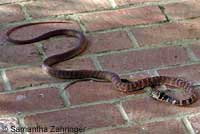 |
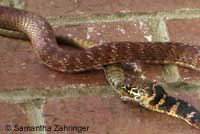 |
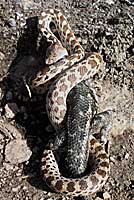 |
 |
||||||||
| A Red Coachwhip eating a San Diego Alligator Lizard. © Samantha Zahringer. Samantha Zahringer watched this coachwhip eat the lizard by her back door. Her kids saw the snake attack the lizard. It raised its head and neck off the ground, swayed for a moment, then struck quickly. Two other lizards nearby froze while the snake swallowed its meal, then they ran away quickly. |
Juvenile Pacific Gophersnake eating a Western Fence Lizard © Daniel Harris | ||||||||||
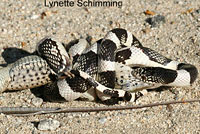 |
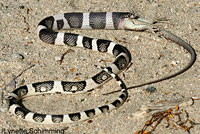 |
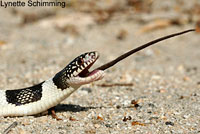 |
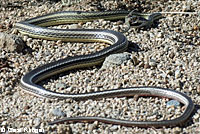 |
||||||||
| A Long-nosed Snake eating a Great Basin Whiptail © Lynette Schimming. | Desert Striped Whiptail, eating a Great Basin Whiptail, © Ceal Klinger | ||||||||||
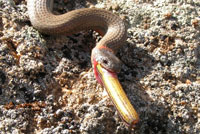 |
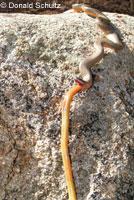 |
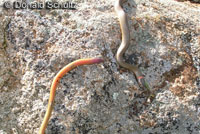 |
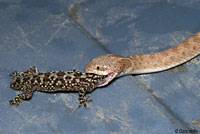 |
||||||||
| Ring-necked Snakes use a mild venom to subdue their prey which include snakes and lizards. This snake from San Diego County regurgitated a California Legless Lizard that it had recently eaten. © Donald Schultz |
A captive Texas Nightsnake eating a Mediterranean Gecko. |
||||||||||
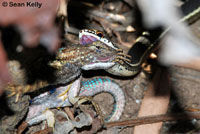 |
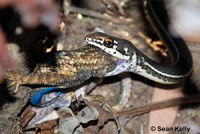 |
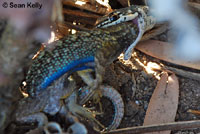 |
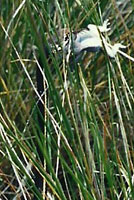 |
||||||||
| Sean Kelly © shot this series of a California Striped Racer eating a male Great Basin Fence lizard in San Diego County. | California Striped Racers eat mostly lizards. This one is swallowing a Western Fence Lizard while holding the front third of its body straight up off the ground. This racer usually hunts with its head in this elevated position. | ||||||||||
 |
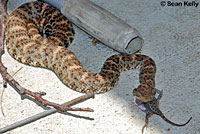 |
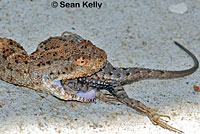 |
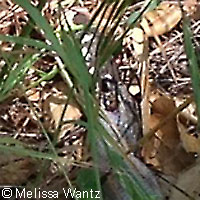 |
||||||||
| A juveile Pacific Gophersnake eating a Coast Range Fence Lizard in Sonoma County © Gérard Menut | Sean Kelly found this juvenile Southwestern Speckled Rattlesnake eating a Great Basin Fence Lizard behind his garbage can one afternoon in San Diego County. © Sean Kelly |
Sometimes a predatory snake loses the fight. A Ventura County San Diego Alligator Lizard bites onto the nose of a predatory California Striped Racer, leaving the snake unable to strike. Eventually the lizard released its grip and the two ran in opposite directions. © Melissa Wantz |
|||||||||
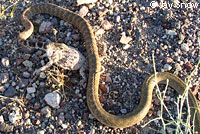 |
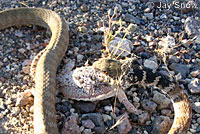 |
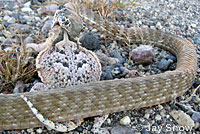 |
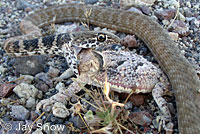 |
||||||||
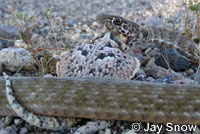 |
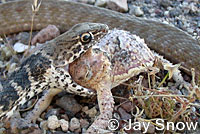 |
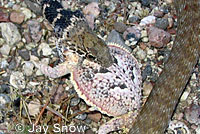 |
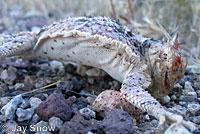 |
||||||||
| Jay Snow took this series (left to right, top to bottom) of a Red Coachwhip trying to eat a live Southern Desert Horned Lizard over a period of 44 minutes. The snake failed to swallow the lizard and crawled away. In the last picture you can see that the lizard lay prone for several minutes after the coachwhip left then took up to 15 minutes to clean the saliva off its face before slowly walking away, no doubt thankful for the row of horns behind its head. © Jay Snow |
|||||||||||
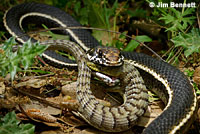 |
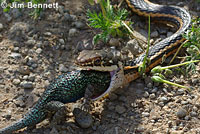 |
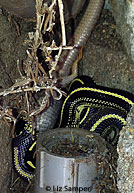 |
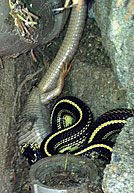 |
||||||||
| A California Striped Racerhas caught a California Alligator Lizard in El Dorado County © Jim Bennett |
A California Striped Racer swallows a male Northwestern Fence Lizard in El Dorado County © Jim Bennett |
This striped California Kingsnake is eating a San Diego Alligator Lizard in San Diego County. © Liz Samperi | |||||||||
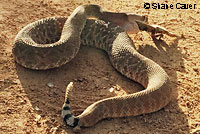 |
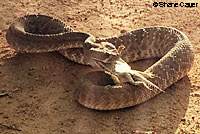 |
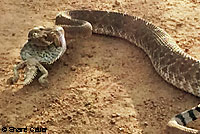 |
 |
||||||||
| An adult Red Diamond Rattlesnake eating a Blainville's (Coast) Horned Lizard in San Diego County © Shane Caver | A Coast Patch-nosed Snake trying to kill and eat a Coastal Whiptail in San Diego County © Tom Day Watch a video of this at the link below. |
||||||||||
 |
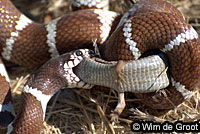 |
||||||||||
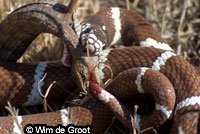 |
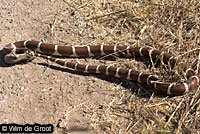 |
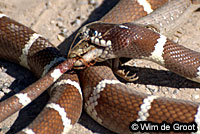 |
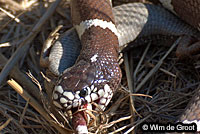 |
||||||||
| This California Kingsnake was observed battling a California Alligator Lizard on a hiking trail in Santa Clara County. The alligator lizard clamped its jaws down on the snake's tail and held on tight even after it died. The snake had to pull and thrash about for more than 20 minutes before the lizard let go of the badly-damaged tail, finally allowing the snake to swallow it. © Wim de Groot | |||||||||||
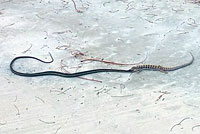 |
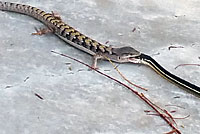 |
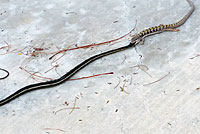 |
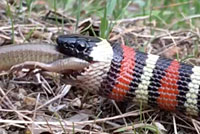 |
||||||||
| This San Diego Alligator Lizard was found biting the head of a California Striped Racer on a driveway in Riverside County. My guess is that the snake tried to eat the lizard which successfully by clamping down on the snake's head. The outcome is unknown. | This California Mountain Kingsnake was found in the wild eating a Western Red-tailed Skink in Kern County © Ryan Sikola |
||||||||||
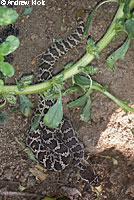 |
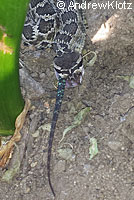 |
 |
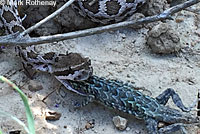 |
||||||||
| Juvenile Southern Pacific Rattlesnake eating a Great Basin Fence Lizard in San Diego County © Andrew Klotz |
This recently-hatched Pacific Gophersnake was found in a garage in mid November trying to eat a dead and dessicated Western Fence Lizard. © 2018 Cindi Christie/Cyanpixel Photography |
This juvenile Southern Pacific Rattlesnake was observed eating a Western Side-blotched Lizard that had been killed on a trail and was dead for some time before it was found by the snake, which took advantage of a free meal. © Mark Rothenay |
|||||||||
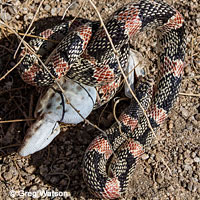 |
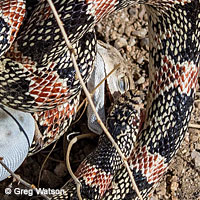 |
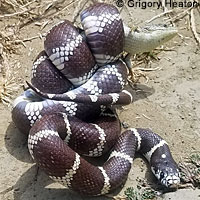 |
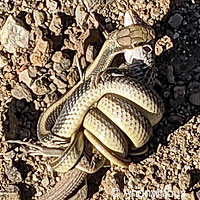 |
||||||||
| Battle of the Long-Noses An adult Long-nosed Snake was found in Kern County coiled around a Long-nosed Leopard Lizard, attempting to swallow the lizard. The lizard managed to keep its mouth outside the snake's mouth and after 20 minutes, the lizard was able to escape the snake's coils and quickly limp away. It's not known if the lizard survived or died later from its injuries. © Greg Watson |
A California Kingsnake has captured a San Diego Alligator Lizard in San Luis Obispo County and is constricting the lizard in its coils. © Grigory Heaton | A Coast Patch-nosed Snake constricts a Coastal Whiptail in Los Angeles County © Anonymous, Picture courtesy of Brian Hubbs. | |||||||||
 |
 |
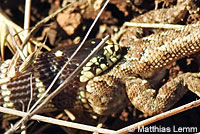 |
|||||||||
| A California Kingsnake eats a Great Basin Fence Lizard in Orange County © Cliff Peebles |
Adult California Kingsnake eating a Side-blotched Lizard, Santa Catalina Island © Matthias Lemm | ||||||||||
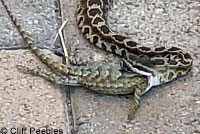 |
|||||||||||
| Juvenile Southern Pacific Rattlesnake eating a Great Basin Fence Lizard on a residential patio in Orange County © Cliff Peebles |
|||||||||||
Snakes Preying On Amphibians |
|||||||||||
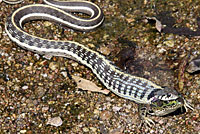 |
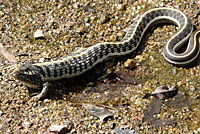 |
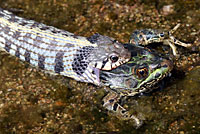 |
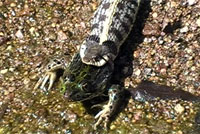 |
||||||||
| A Western Black-necked Gartersnake eating a Chiricahua Leopard Frog. After these pictures were taken, the snake swam across a small pool and finished swallowing the frog, as you can see in the video of this below. | This video shows the Western Black-necked Gartersnake seen to the left, swallowing a Chiricahua Leopard Frog, back legs first. The snake swims across the creek to finish eating against the bank, then swims into some roots to hide. The video has been severely edited to keep it short. The entire swallowing activity, after I discovered the snake with the frog half eaten, took about ten minutes. |
||||||||||
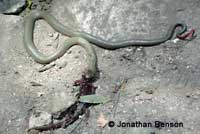 |
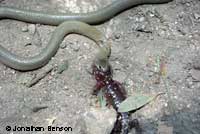 |
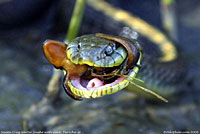 |
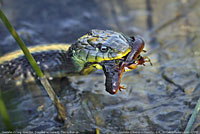 |
||||||||
| An adult San Bernardino Ring-necked snake eating an adult Arboreal Salamander in Los Angeles County © Jonathan Benson | A Santa Cruz Gartersnake eating a toxic newt. The newt is either a Rough-skinned Newt or a California Newt. Both are extremely poisonous to most animals, including humans, but some gartersnakes are immune to this poison. © Odophile.com | ||||||||||
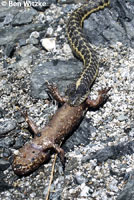 |
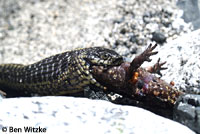 |
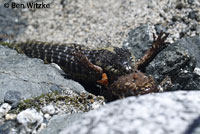 |
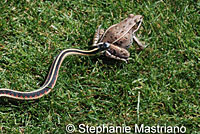 |
||||||||
| An Oregon Gartersnake eats a neotenic Coastal Giant Salamander in Trinity County. © Ben Witzke | This Valley Gartersnake was found attempting to eat a non-native Leopard Frog in a suburban backyard. (The frog survived, but died later.) © Stephanie Mastriano |
||||||||||
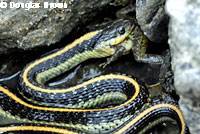 |
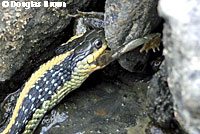 |
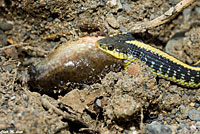 |
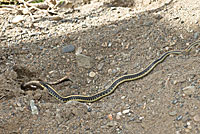 |
||||||||
| Adult Diablo Range Gartersnake eating a frog (Foothill Yellow-legged Frog) at the edge of a creek in Santa Clara County © Douglas Brown | Bullfrogs are an invasive species that consume many native species, so it is nice to see this adult Diablo Range Gartersnake eating a Bullfrog tadpole in Santa Clara County. Although eventually the snake regurgitated the tadpole. It was probably too big for it to eat. © Chad Lane |
||||||||||
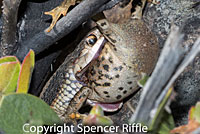 |
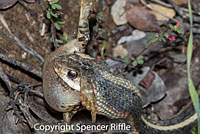 |
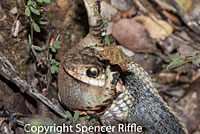 |
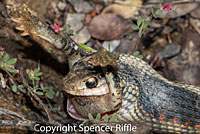 |
||||||||
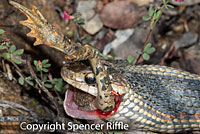 |
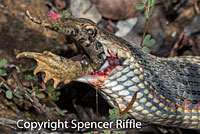 |
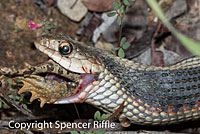 |
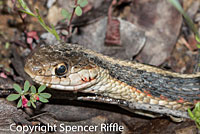 |
||||||||
| Adult Valley Gartersnake eating a Boreal Toad in Trinity County © Spencer Riffle |
|||||||||||
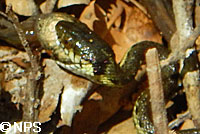 |
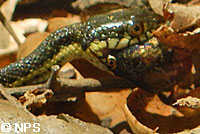 |
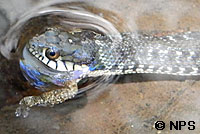 |
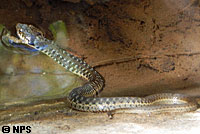 |
||||||||
| This juvenile Two-striped Gartersnake is eating a Baja California Treefrog tadpole. © NPS |
This juvenile Two-striped Gartersnake is eating a young California Treefrog. © NPS |
||||||||||
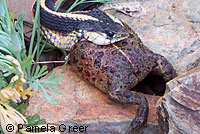 |
 |
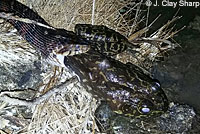 |
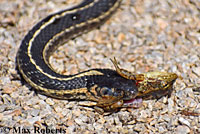 |
||||||||
| Most toads are poisonous to other animals, or they taste so bad that a predator will not eat them. But this Valley Gartersnake had no concerns about eating a California Toad. © Pamela Greer |
A Southern Watersnake eating an introduced American Bullfrog © J. Clay Sharp | Adult Mountain Gartersnake eating a juvenile Southern Mountain Yellow-legged Frog in Tulare County © Max Roberts |
|||||||||
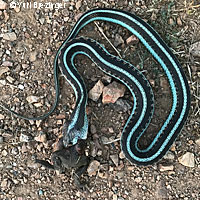 |
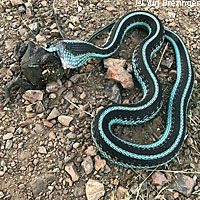 |
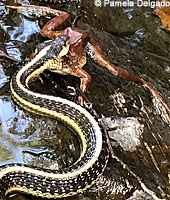 |
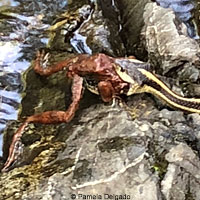 |
||||||||
| This unusually-colored adult Valley Gartersnake was found eating a California Toad. © Yuri Brezinger |
An intergrade Aquatic Gartersnake in Napa County eats a frog (either a California Red-legged Frog or a Foothill Yellow-legged Frog.) © Pamela Delgado | ||||||||||
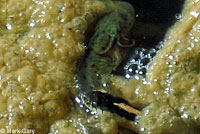 |
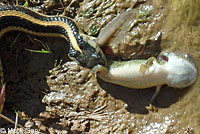 |
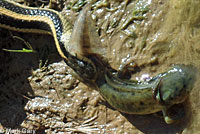 |
|||||||||
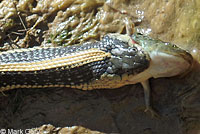 |
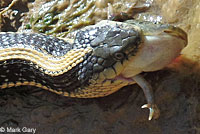 |
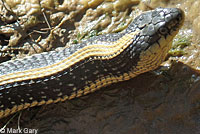 |
|||||||||
| This series shows a Diablo Range Gartersnake eating a California Tiger Salamander larva in Contra Costa County. The snake caught the larva in the water, then brought it to shore to swallow it. © Mark Gary |
|||||||||||
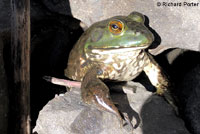 |
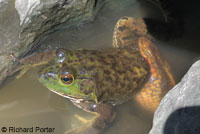 |
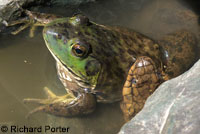 |
|||||||||
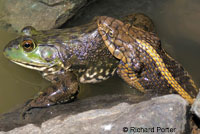 |
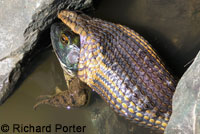 |
 |
|||||||||
| These pictures show an adult Giant Gartersnake eating an adult female American Bullfrog in Sutter County. © Richard Porter | |||||||||||
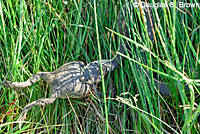 |
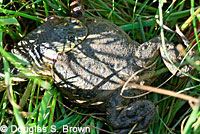 |
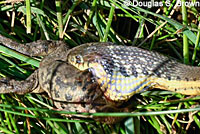 |
|||||||||
| This adult Two-striped Gartersnake was observed eating a California Toad in San Diego County. It took the snake almost 45 minutes to completely swallow the toad, which had puffed its body up to make itself harder to swallow. You can also watch a YouTube video of the event: Two Striped Garter Feeds on a California Toad © Douglas S. Brown |
|||||||||||
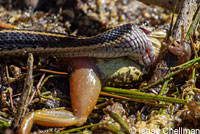 |
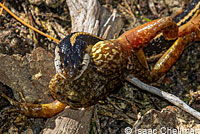 |
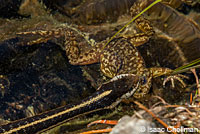 |
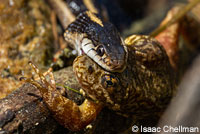 |
||||||||
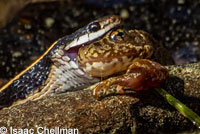 |
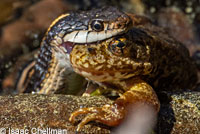 |
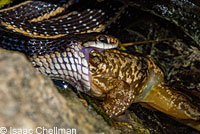 |
|||||||||
| The pictures above show a Mountain Gartersnake discovered by Spencer Williams that is preying on a juvenile Sierra Nevada Yellow-legged Frog in Eldorado County. The last picture shows the frog being swallowed head first. © Isaac Chellman | |||||||||||
 |
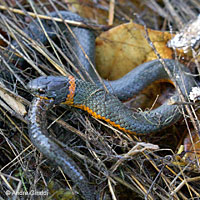 |
||||||||||
| Adult Terrestrial Gartersnake eating a toxic California Newt in San Luis Obispo County © Ryan Sikola You can read about gartersnakes eating toxic newts here. |
A Pacific Ring-necked Snake eating a California Slender Salamander in Marin County © Andre Giraldi | ||||||||||
 |
 |
 |
|||||||||
 |
 |
 |
|||||||||
| This Diablo Range Gartersnake was observed in October eating a toxic California Newt in Alameda County at the edge of a newt breeding pond. You can see the snake biting the tail, then swallowing the newt tail first and then the head. You can read about gartersnakes eating toxic newts here. © Mark Gary |
|||||||||||
 |
 |
 |
|||||||||
| This tiny juvenile Diablo Range Gartersnake was observed in December eating a recently-transformed juvenile California Newt on the edge of the same newt breeding pond in Alameda County where the adult snake above was observed eating an adult newt. © Mark Gary | |||||||||||
 |
 |
||||||||||
| Diablo Range Gartersnake eating a Foothill Yellow-legged Frog in Santa Clara County © Zachary Lim | |||||||||||
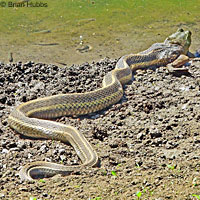 |
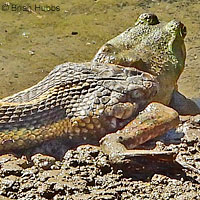 |
||||||||||
| Adult Giant Gartersnake eating an American Bullfrog © Brian Hubbs | |||||||||||
Snakes Preying On Eggs and Invertebrates |
|||||||||||
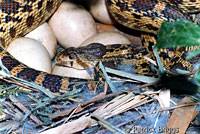 |
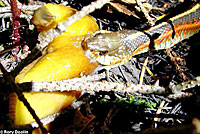 |
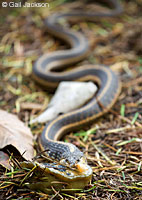 |
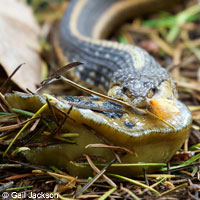 |
||||||||
| Snakes do not aways kill and eat live animals. This Pacific Gophersnake is in a nest eating a duck egg, © Patrick Briggs |
A Coast Gartersnake eating a yellow Banana Slug © Rory Doolin | Adult gartersnake of undetermined species eating a banana slug in Mendocino County. (It's either a Coast Gartersnake or an Oregon Gartersnake.) © Gail Jackson |
|||||||||
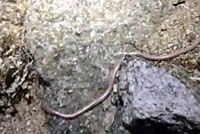 |
|||||||||||
| This large Desert Threadsnake was observed searching out then attacking an ant colony that was moving or relocating their eggs. At the end it looks like the snake may have disappeared down into the ant nest. © Jeff Nordland | |||||||||||
Snakes Drinking Water |
|||||||||||
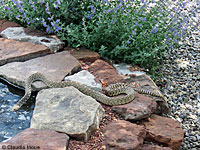 |
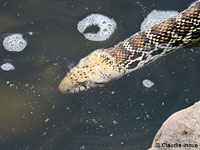 |
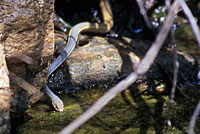 |
|||||||||
| Adult Bullsnake drinking from an artificial pond, Santa Fe County New Mexico © Claudia Inoue |
A Sonoran Whipsnake drinks water from a small desert pool. | ||||||||||
 |
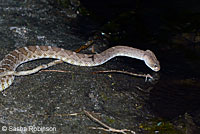 |
 |
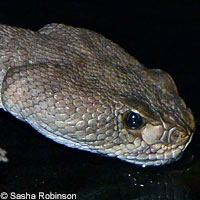 |
||||||||
| This Red Diamond Rattlesnake was photographed at night in the San Diego County desert drinking from a creek in mid April. The snake was seen crawling down the creek banks then drinking for about two minutes before crawling back into the scrub above the creek. © Sasha Robinson | |||||||||||
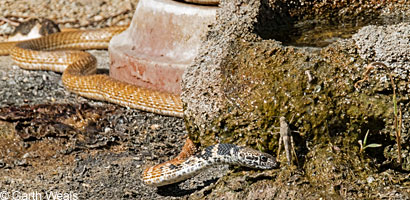 |
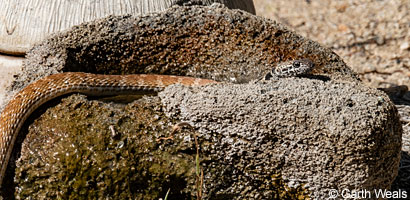 |
||||||||||
| This adult Red Coachwhip was observed drinking at a water feature in the Kern County desert. It was not interested in the large grasshoppers found nearby, only in the water. © Garth Weals |
|||||||||||
Return to the Top
© 2000 -

